
Sumer is one of the oldest civilizations known to have existed. The first permanent cities may have been settled along the Euphrates and Tigris rivers of Mesopotamia (modern day Iraq) as early as 5500 B.C., and written records date back as far as 3300 B.C.. The Sumerians were among the first adopters of agriculture, as the fertile floodplains of the "cradle of civilization" allowed for an abundance of food that enabled large, urban population centers.
Gilgamesh is an epic hero and king in Sumerian mythology. The Epic of Gilgamesh (transcribed in cuneiform on stone tablets) is the oldest surviving work of literature, and is credited as the world's first work of great literature. Copies of the poem were discovered in the ruins of the royal library of the Assyrian king Ashurbanipal. According to the epic poem, Gilgamesh was a demi-god who is best known for taming the wild, feral man Enkidu and forging a lasting friendship with him. The two adventured together many times before Enkidu was killed by the gods for defying their will and helping Gilgamesh to kill the sacred Bull of Heaven. The death of his friend sent Gilgamesh into depression, and he dedicated the rest of his life (according to the poem) to a futile search for eternal life. Scholars and historians originally dismissed Gilgamesh as a mythological figure, but archaeological finds suggest that he may have been a real historic king of Uruk sometime between 2800 and 2500 B.C.. Whether the stories are based on true events, or are purely myth, they can be seen as an allegory for civilization itself, which Sumer, and Gilgamesh, helped to establish.
DISCLAIMER:
Civilization VI is still very early in its life-cycle. Strategies for the game (and for specific leaders and civs) may change as Firaxis applies balance patches, introduces new features, or expands the game through DLC or expansion packs, or as the Civ community discovers new strategies. As such, the following strategy guide may change from time to time. I will try to keep it up-to-date, and will make notations whenever changes are made. I'll also post links in the official 2K forums and CivFanatics, where I'll also report any changes made. If possible and practical, I will try to retain the original content of the strategy for posterity.
I welcome any feedback or suggestions that readers wish to offer. Feel free to post on the linked forums, or by posting a comment at the bottom of the page.
This guide is up-to-date as of the December 2016 patch (ver. 1.0.0.56).
Gilgamesh might be a very good leader for beginners to the game. Gilgamesh encourages making friends and allies, and his uniques grant early game bonuses that will help new players get off to a good start. The bonus reward for clearing barbarian encampments will also help teach new players to build a sizeable early military and go hunting for barbarians, which is a good strategy for Civ VI in general, regardless of your leader or civ. So I recommend Gilgamesh as a good place to start, and he will be the subject of my first Civilization VI strategy guide!
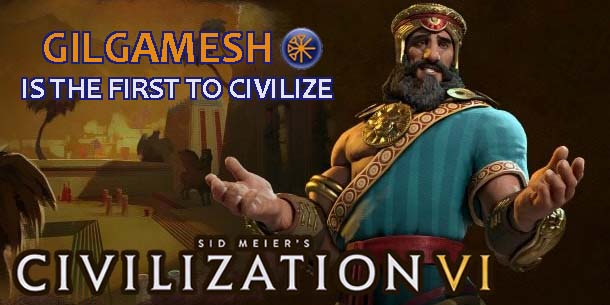
Gilgamesh's uniques in Civilization VI
Sumeria's capital start bias: rivers.

Sumerian civilization unique: Epic Quests
"Every time you capture a barbarian outpost, you also get a tribal village reward. Pay half the usual gold cost to levy city state units."
Sumer's ability treats barbarian outposts as if they were tribal villages ("goody huts"). In addition to getting the normal lump sum of gold (as well as any combat experience for defeating the barbarians within the outpost), Sumer may get additional gold, faith, tech/civic boosts, free scouts, extra population, or any of the other rewards that are possible from a tribal village. Aggressively hunting and dispersing barbarian outposts is, thus, a way for Sumer to get off to a running start and set itself up as a dominant early-game leader in technologies, civics, gold, faith, and so on.
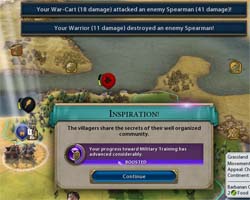
You don't know what you'll get from barb outposts.
The downside is that you don't know what you're going to get, so it's difficult to plan for specific outcomes. You can't rely on getting a specific tech or civic boost in order to beeline for a particular district or wonder, nor can you rely on getting the free faith necessary to start your own pantheon. If you intend to pursue such things, you'll still need to work towards earning any relevant tech or civic boosts yourself, or building the prerequisite infrastructure.
If you're in position to take an outpost, then you should take it! Otherwise, a rival civ or city state may swoop in and clear it out instead (which grants you no reward), or the barbs may spawn extra units that could turn the tide of battle in their favor. Don't feel afraid of the possibility of accidentally being awarded a tech or civic boost that you were actively trying to achieve. Sure, it means you won't be getting the optimal impact of the reward, but your boosts should be coming from activities that are beneficial anyway. Don't build two galleys in order to boost the shipbuilding technology if you have no use for galleys!
Feel free to poach weakened outposts from other players, and grab them when the barbs leave them undefended.
The last element of Sumeria's ability is that he can levy the military of a city state at half cost. If you're not able to get your own units to the front lines of battle with your allies, then levying a nearby city state can be a great way to get your units there and partake in the sharing of sweet, sweet pillage rewards. You can also use this ability to help defend yourself from invasion by using any suzerain city states near your empire to shield yourself from invasion. Remember that once the levied units revert to city state control, you'll effectively lose out on any experience or promotions they've earned. Be careful that another civ doesn't levy those same units against you!
Gilgamesh's leader unique: Adventures With Enkidu
"May declare war on anyone at war with their allies without warmonger penalties. When at war with a common foe, they and their allies share pillage rewards and share combat experience gains if within 5 tiles."

Gilgamesh is a leader who is keeps his allies close, but who also still makes enemies and shouldn't hesitate to draw the sword when provoked. The sharing of experience and pillage rewards only works for allied units within five tiles of each other, so you'll need to make sure that you and your war partner agree on where the front-line of battle should be. If your partner sits back and lets you do all the work, then you'll be granting them free experience and pillage rewards, but you won't be getting anything back in return. The inverse is also true. A.I.s won't be smart enough to notice you leaching bonuses off of their units' efforts, but other human players probably will and may not tolerate it.
Gilgamesh also does not suffer warmonger penalties with A.I. civs whenever Gilgamesh declares war on a civ that is already at war with one of Gilgamesh's allies. This allows you to move swiftly to protect your allies from other players' aggression whether you have a casus beli or not. This requires formal "Allied" status, which means both Gilgamesh and his ally must have researched the Civil Service civic and have diplomatically agreed to an Alliance treaty. Of course, this aspect of the ability has no effect in multiplayer games with no A.I. opponents, as the warmonger mechanic doesn't apply to human players. It's also important to note that your warmonger leeway only applies to the declaration of war! If you counter attack and begin taking cities belonging to the civ that attacked your ally, then you will suffer normal warmonger penalties.
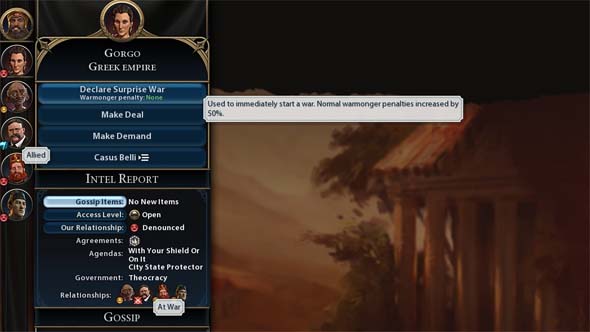
Gilgamesh won't incur warmonger penalties when declaring against his allies' opponents.
Helping an ally to defend against an invasion within their own borders is a great way to ensure that you'll both share in some combat experience, since your ally will likely be throwing everything they've got at the attackers. You won't get any xp or rewards from your allied cities' bombardment though.
Unique improvement: Ziggurat

Game Info:
"Unlocks the Builder ability to construct a Ziggurat, unique to Sumeria.
+2 Science. +1 Culture if next to a river. Cannot be built on hills."
Requirements: No tech or civic requirement. Cannot be built on hills.
Effects: +2 science. +1 Culture if next to a river. Boost of +1 culture after researching Natural History civic.
The Ziggurat has no tech or civic prerequisites, and can be built by builders from the start of the game. The 2 science is equivalent to the adjacency bonus that a campus gets from a pair of mountains, or for a Library building, and can give Sumer a strong technological lead early in the game. Building them along rivers grants a point of culture as well (which will speed up progress along the civic tree), and you'll get an extra culture from them once you complete the Natural History civic. Lastly, the Flight technology grants tourism to all improvements that generate culture. This includes the Ziggurat.
Do be warned, however, that the cost of districts and buildings scales up with your progress through eras. So building (and working) too many Ziggurats early in the game can quickly inflate the cost of infrastructure for your cities. The advantage of the Ziggurat is that it is an improvement instead of a district, which means you can assign or un-assign citizens to work it depending on your need. If you find your districts are getting too expensive, then assign your citizens to different tiles (such as forests or hills that generate production) in order to reign in your research.

Unique unit: War Cart
Game Info: "Sumerian unique ancient era unit. Stronger than all other starting units. No penalties against anti-cavalry units. 4 movement points if it starts in open terrain."
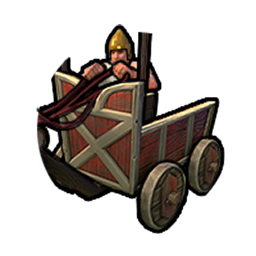
Requirements: none.
Obsoleted: Stirrups technology,
Upgrades to: Knight.
Cost: 55 Production / 55 Gold [Standard speed].
Maintenance Cost: none.
Attack Type: Melee, Unit Class: Heavy Cavalry,
Strength: 30.
Movement Speed: 3.
Bonuses:
No penalty against anti-cavalry units,
+1 movement if starting in open terrain,
Ignores enemy zone of control.
The donkey-driven War Cart is the strongest starting unit in the [vanilla] game, and is a very powerful and versatile unique unit. It does not replace the Heavy Chariot, but it is strictly superior to the Heavy Chariot, is cheaper to build, and doesn't require horses, so there's no reason for Sumer to bother building Heavy Chariots. The one exception (and downside) is that since the War Cart doesn't replace the Heavy Chariot, if a city state quests you to train a Heavy Chariot, then a War Cart does not fill this need.
The War Cart's 30 combat strength makes it 5 points stronger than a Spearman, and only 5 points weaker than a Swordsman. It is faster than the Heavy Chariot, ignores zone of control, and is not vulnerable to Spearmen. On most game speeds, it should only take a couple turns more to build than a Warrior, so there is no reason to not start producing them as one of the first few builds from your capital.
The speed, strength, and lack of vulnerability to spearmen makes the War Cart an ideal anti-barbarian unit. Sending out a few of them to scour the map for barbarian outposts will help Sumeria earn extra rewards using its Epic Quests national ability. They can also mobilize quickly to act as strong defensive units and a deterrent to invasion. Their early availability, strength, and cheap cost also makes them a potent unit for early conquest rushes. And if you don't mind declaring surprise wars and taking some early warmonger-hate, then War Carts are ideal for finding and capturing any un-escorted Settlers; thus, turning high-difficulty A.I.'s free unit into your free unit!
Taming the wilds with Gilgamesh of Sumeria
Gilgamesh' uniques all come into play early in the game, so you'll need to get to work immediately at using them.
War Carts should be a very early priority. They make great defensive units, and can easily kill barbarian Scouts before they can send a horde to your cities. Once you have enough units to reasonably defend yourself, send out a group of War Carts to hunt down as many barbarian outposts as you can find. Any units that aren't being dispatched should remain in your borders. Don't patrol outside of your borders, since you actually want barbarian outposts to spawn in easily-accessible fog of war near your territory.
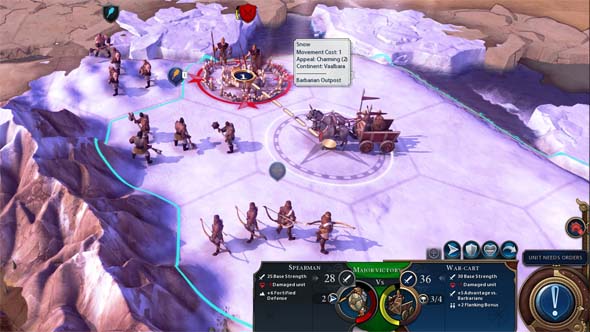
Discipline and flanking bonuses allow War Carts to dominate against barbarians.
Researching the Military Tradition civic will unlock the Maneuver policy, as well as grant flanking bonuses to your units. Clearing your first barbarian outpost will grant you the boost towards this civic (if you haven't already gotten it from a tribal village), and its abilities and policies will help you clear out further outposts. With Maneuver adopted, you can pump out a large army of War Carts, then switch to Discipline in order to make mince meat of any barbarians that spawn within your sphere of influence. The high strength of the War Carts does mean that Discipline may not be necessary, so you can instead adopt Survey if you want some extra experience for any Scouts. Though, Discipline can still be useful for keeping said Scouts alive as they get further out into the frontier. Having the Oligarchy government will also grant another boost to your combat strength for melee units if you want to use them as support.
If you decide to unlock a pantheon, then you should consider the Initiation Rites pantheon, which grants large sums of faith for clearing barbarian outposts. You'll be hunting outposts down anyway for the Epic Quests rewards. Of course, if the map will grant a very strong reward for another pantheon (depending on terrain and clustered resources), then feel free to go after whichever pantheon seems the most beneficial. Sumer doesn't have a particularly strong affinity for religious play, but if random luck grants you large chunks of faith early from tribal villages and barbarian outpost rewards, then Sumer can become a strong religious contender.
As the game progresses, you should periodically scan the map for any new barbarian outposts. The Coastal Raid ability of Privateers (and later Submarines) can be very useful for clearing coastal outposts on island or continents maps. If you took the Ambush promotion (+20 strength) for your Scouts earlier in the game, then they can potentially be used as barbarian hunters. After Scouts are upgraded to Rangers, they become much more viable as barbarian hunters. If you don't have any surviving Scouts (or didn't take the Ambush promotion), then you should have enough heavy cavalry to dedicate a few to scouring the map for barb outposts.
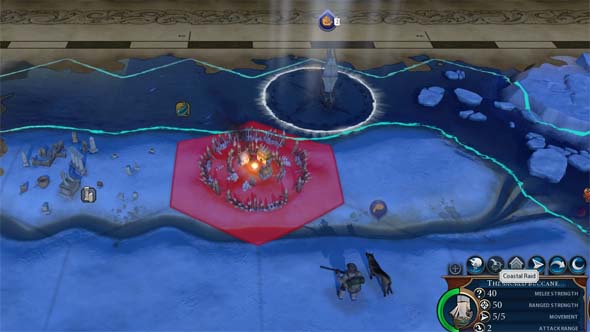
Privateers and Submarines can use Coastal Raid to pick off coastal outposts, while Rangers hunt for inland outposts.
All these tips assoicated with hunting barbarians is contingent on having an appropriate map. On particularly small maps- or maps with very little fog of war - there won't be many barb outposts spawning. On the highest difficulties, it may also be hard to clear barbarian outposts, since the A.I. civs will start the game with free units and bonuses that will allow them to quickly expand and exterminate barbarians on their own.
Sharing units and rewards
Even if the map doesn't allow for much barbarian-hunting, Sumer's early bonuses can still be used. A horde of War Carts are a powerful invasion force that few civilizations would be able to effectively defend against. War Carts aren't vulnerable to Spearmen and have raw strength comparable with Swordsmen, so they can be used throughout the entire ancient and classical eras. If you intend to pursue a Domination Victory, then you should use your War Carts to capture a capital or two early in the game.
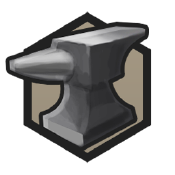
War Carts do not require horses (or maintenance!), so you can build mass numbers of them without restriction. However, they upgrade to Knights, which do require iron. So make sure you secure at least one source of iron before progressing to the medieval era.
If you're not pursuing your own conquests, then you may want to settle into the role of a "peace-keeper" and try to build friendships and alliances. Defending smaller civilizations from superior invasion forces can squash the domination ambitions of other civs, and fighting on the front-lines of other players' wars will allow your units to leech experience and some pillage yields. You won't suffer any warmonger penalties for declaring on an opponent who is already at war with your allies, so don't hesitate to jump into the fray if you have the military strength to do so.
If you find yourself face-to-face with superior foes, don't forget that you can levy city state units at half cost. You can use levied units as forward-operating units, or to attack an opponent's vulnerable fronts, or use nearby city states as a defensive buffer around your own cities. If you see a city state moving on a barbarian outpost, you can even consider levying their units in order to clear the outpost for your own reward - though, this is probably too expensive to be worthwhile unless you have other plans for those units.
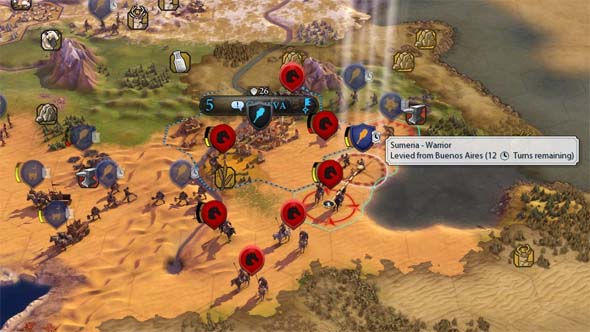
Sumeria can cheaply levy city state units to protect themselves from threats or help hunt barbarians.
Just keep in mind that levied units are fleeting. They only remain under your control for a set period of time, and if you lose your suzerain status, all the units will revert to the city state's control with no reimbursement for the gold you spent. If the levied units acquired any promotions while under your control, they'll keep them. If your enemies become suzerain of that city state, then those promoted units could end up being deployed against you!
If you have a tight grip on nearby city states, then you can even consider deploying your military for offensive actions and maintaining only a minimal defensive force and avoid maintenance and production times for such units. If you are threatened, you can levy a city state's units in order to defend yourself. You can even bait A.I.s into trying to take advantage of your "weak military", then levy a sizeable army to crush their "surprise" invasion force.
Ziggurats are temples of culture and science
Whether you're planning a Domination Victory or some other victory, make sure to utilize Sumeria's other early-game bonus: the Ziggurat. Try to exclusively build them along rivers in order to get the maximum benefit. Use the Ilkum policy to pump out a surplus of Builders and get some Ziggurats going early. This will give you a head start in both the tech and civic trees that might give you priority-access to whichever wonders, districts, and units that you might want.
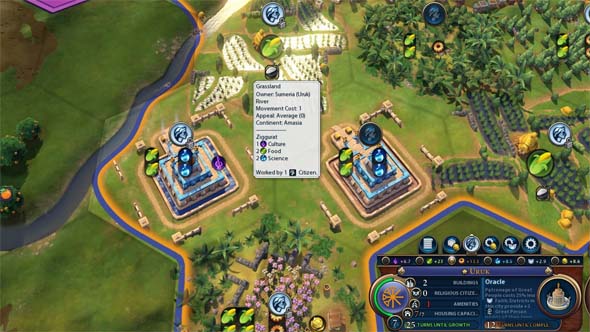
Prioritize Ziggurats adjacent to rivers, and stop working them if your era progression is outpacing your production.
If you got early faith and decided to found a pantheon, then the Wat building and Jesuit Education belief can be a powerful augment to the science advantage that your Ziggurat's will provide.
Be careful about pushing your science too far too early. As you progress through the eras, city infrastructure (particularly districts) become more expensive. If you lack to production to build districts, you can fall behind in other areas.
The same problem can also apply to military. If you tech too early to expensive, advanced units, you might not have the production yet to build those units in a timely enough manner when you need them. If your tech progress is outpacing your civic progress, you can also find yourself with access to advanced-era units, but not possessing the respective era's unit-production policies.
The advantage of the Ziggurat is that you can chose when to work it, which means you have control over how fast you want to tech!
The Ziggurat will also receive some tourism once Flight is researched. This will provide a small boost to any Culture Victory aspirations you may have.
Playing against Gilgamesh: Getting the best of Enkidu's ally
Gilgamesh's A.I. agenda: Ally of Enkidu
"Likes civilizations who are willing to form a long-term alliance. Dislikes anyone denouncing or attacking his friends and allies."
Gilgamesh can be a valuable ally, but also an intimidating foe. His cheap and powerful War Carts can swarm your units and cities and dominate the battlefield. There is no real counter to them either (since they have no penalty against Spearmen). If Gilgamesh is threatening you, then your only recourses are to either outnumber him or out-tech him. Use ranged units to damage his War Carts from behind the cover of strong infantry (or behind the cover of city walls), and don't overreach, or else the speed of the War Carts will likely allow them to surround your units and use flanking bonuses to pick them off.
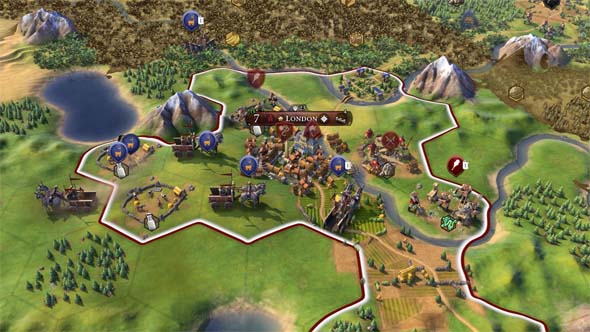
Sumeria is a prime candidate for an early unit rush.
If he's not threatening you militarily, then you can still expect Gilgamesh to be a formidable scientific rival due to the extra science from Ziggurats. Gilgamesh has greater science potential than most other civs due to his unique improvement. You should expect him to jump out ahead early, and don't be surprised if he becomes a run-away science civ. If he has lots of rivers nearby, then he'll likely have faster civic progression as well. Keep this in mind when planning which wonders you want to pursue. If you have open borders, then send a unit through his territory to find out which districts he's prioritizing, and whether he's building Ziggurats.
If you're worried about him getting too far ahead, then you can always declare war to capture his cities and/or pillage his Ziggurats. Just be advised that in Civ VI, you do not keep captured unique improvements! So you cannot steal his Ziggurats and use them for yourself.
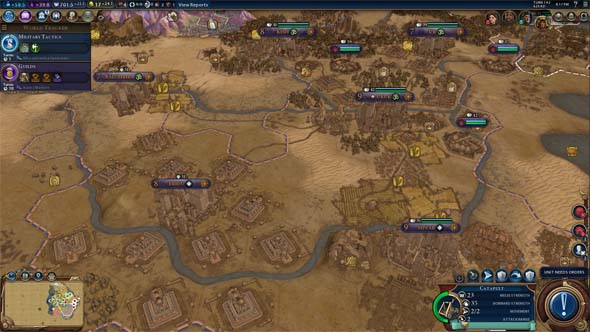
Sumeria can be a scientific run-away A.I. It's 600 A.D., and he's already in the modern era...
The random nature of tribal village rewards means that it's hard to predict where, exactly, Gilgamesh will excel. Just be vigilant.
Most importantly: don't let Gilgamesh jump out ahead unchecked. Having extra science and culture (and potentially extra eurekas / inspirations from barbarian outposts) early can give him a near-insurmountable head start. Don't let him coast to a victory.
Being Gilgamesh's Enkidu
If you get favorable relations with Gilgamesh, and he isn't a runaway that's threatening your own victory, then he can be a very useful ally. This is especially true for militaristic civs, since partnering with him in war allows your units to accumulate experience faster. Just be sure that you trust him to be loyal; otherwise, you might just be handing his units experience and promotions that will eventually be used against you.
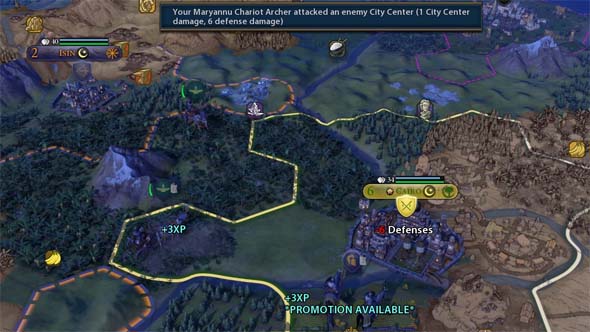
Sumeria shares experience with its military partners.
You can expect him to divert some resources towards hunting barbarian outposts. So if you start near him, you can leach some experience from his barbarian-hunting. Gilgamesh shares experience against barbarians with every other player (including players that Gilgamesh is at war with). This works both ways though. If you fight barbarians within proximity to Gilgamesh's units, then you'll be giving free experience to his units, which they may later use against you.
Change Log
Thanks for reading. I hope this guide helps you to build a Sumerian civilization that will stand the test of time!
Feel free to comment and share, or discuss this strategy in the CivFanatics forums at:
https://forums.civfanatics.com/
threads/a-general-strategy-for-gilgamesh.610833/
or on the official 2K forums:
https://forums.2k.com/showthread.php?
4310661-A-general-strategy-for-Gilgamesh&p=14825498#post14825498
[Show Change Log] [Hide Change Log]
February 22, 2017
Added game patch and version number to the Disclaimer.
Corrected: Knights require iron instead of horses.
February 24, 2017
"Pay half cost to levy city state units" is part of Sumerian national ability, not Gilgamesh's ability.
Researching Flight adds tourism to Ziggurat.
9 August, 2018
Added start bias.